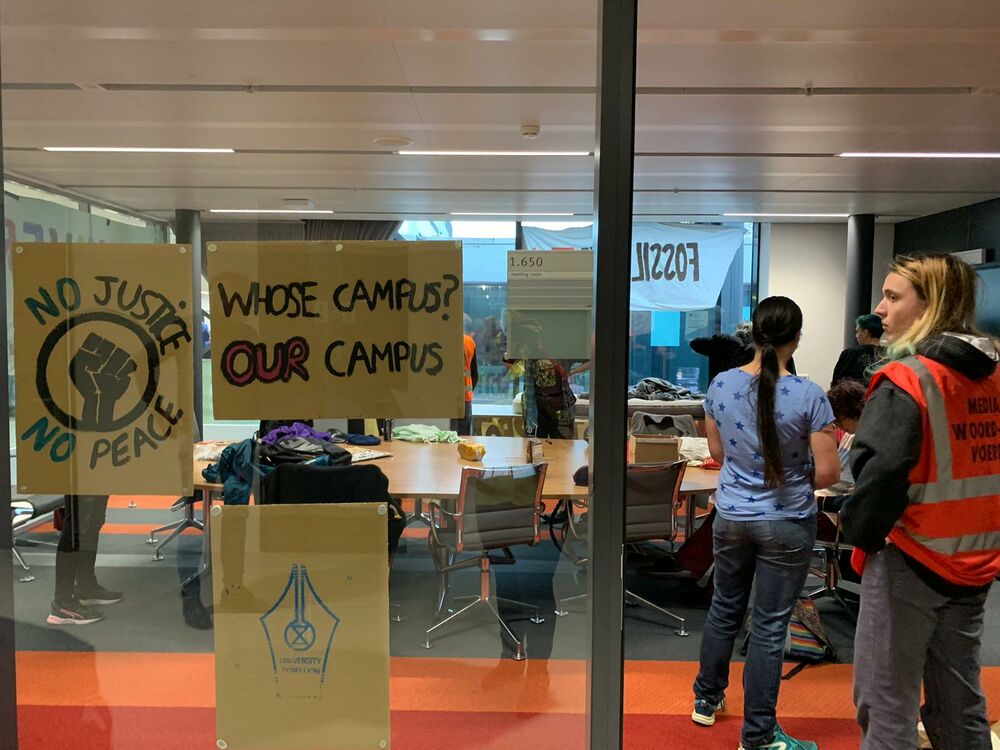End Fossil students spoke with Vice-Rector Rob Mudde on Thursday. What was the outcome of the meeting?
By talking, TU Delft hopes to avoid an occupation like the one here in Eindhoven. (Photo: Bridget Alcione Spoor/Cursor)
At first glance, the list of demands of the End Fossil LU/TUD studentes (Leiden University and TU Delft) for the Executive Board seems clear and straightforward. But anyone thinking more deeply about the three points will see that, from the perspective of TU Delft, some of the demands are complicated. This also transpired at a meeting between the pressure group and Vice-Rector Rob Mudde.
How the students ended up at the table with the Executive Board is also worth mentioning. One day earlier they held a lunch lecture where they discussed the activities that they should undertake to force a meeting. Recently, kindred spirits had occupied Erasmus University and TU Eindhoven. What was needed at TU Delft to be heard? “You can just make an appointment,” responded Communications Director Joost Ravoo, who came to listen, drily. The appointment came the very next day.
Leader
The five students had prepared themselves well. They handed over a list of demands to Mudde and explained it calmly. The demands are listed in an online petition. The first point – ‘stop fossil subsidies and spend that money on education and research’ – is actually targetted at the Government and not at TU Delft and could be skipped.
After the students’ explanation, Mudde jumped straight to the third point, avoiding tricky point two about breaking ties with the fossil fuel industry. Point three demands TU Delft to be ‘a leader in dealing with the climate crisis’. This is already the case, said Mudde, summing up a long list of initiatives that TU Delft is working on.
‘We will not cut all ties with the fossil fuel industry’
Among them were the Green TU Delft student teams, holding the Energy Challenge, the appointment and activities of Professor of Sustainability Andy van den Dobbelsteen, the pledge to put EUR 100 million into a CO2 neutral campus, and the development of bachelor and master degree programmes on subjects such as the climate and the energy transition. “These will help us supply a new type of engineer from 2030 onwards,” said Mudde.
The students admitted that TU Delft is doing a lot. “But there is more potential. Take the Green student teams. At the moment they only have an advisory role. Give them a stronger position in the decision-making process.” The students want climate education to be a standard part of all curricula. Mudde promised to investigate this, although he did point out that his influence is limited. “I cannot impose this from above. So it may not happen.”
Moral credibility
After a student deftly steered the discussion to their main demand (End Fossil), Mudde became adamant. “We will not cut all ties with the fossil fuel industry. We are working with these companies to speed up the energy transition together.” What then followed was a discussion in which Mudde emphasised that TU Delft and society need fossil fuel companies to bring about the energy transition. The students tried to entice him to make a statement about the moral problem of this for a university that preaches climate action.
‘Fossil fuel companies are working against the energy transition’
As an example, Mudde pointed to the e-Refinery in which TU Delft is working with partners such as Shell to try to bring about an energy transition in the energy guzzling chemical industry. “This is how we will move away from fossil dependence.” But the students believe that the problem is both wider and more fundamental. “The underlying assumption is that we are in an energy transition. This is not the case. Fossil fuel companies are working against this.” The students pointed out the anti-scientific history of oil and gas companies and to their investments that are almost all about mining for more oil and gas and not about green initiatives. Projects like e-Refinery keep this industry going, the students believe, so that they can give themselves a green image. “We legitimise them to continue with business as usual. This is a liability for TU Delft. It is about moral credibility.”
The students believe that TU Delft and all other universities must stop accepting money from the fossil fuel industry, and must ask the Government and other bodies like pension funds for more research funding. Mudde does not believe that this will happen. “That will never work. Furthermore, we need the fossil fuel companies to scale up the energy transition. And we use our contacts to steer these companies away from bad practices.”
Financial streams
Mudde is interested in looking into some of the demands though. He said that he would contact TU Eindhoven, that has recently agreed to transparency about the financial streams from fossil fuel companies to the University. He is also prepared to look at another of the students’ demands, that of banning fossil fuel companies from recruitment events such as the Delftse Bedrijvendagen. “I do not know if it is possible, but I will discuss it with the organisation.” A new meeting between End Fossil and TU Delft will be held in January.
Do you have a question or comment about this article?
s.m.bonger@tudelft.nl


Comments are closed.